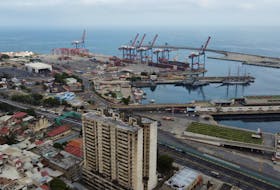CHARLOTTETOWN, P.E.I. - Toronto Blue Jays founder Don McDougall and provincial deputy minister Neil Stewart were called to testify in P.E.I. Supreme Court Tuesday in an Aboriginal land-title dispute that many believe could be a precedent-setting case.
P.E.I.’s two Mi’kmaq First Nations have filed for a judicial review of the sale of the Mill River property in 2017 to Don McDougall.
The Mi’Kmaq are seeking a declaration the province failed in its duty to consult and accommodate the Mi’kmaq of Prince Edward Island on this deal and that the transfer of Crown land to McDougall be declared invalid.
Related: Mi’kmaq Confederacy files injunction against Mill River Resort
In the opening day of hearings Tuesday, McDougall testified he has been caught in the crossfire of a dispute he contends is solely between the province and P.E.I’s Indigenous chiefs.
He told the court Tuesday he took “extraordinary precautions” during his negotiations with the province to ensure there was clear title to the land before finalizing his purchase deal.
He testified he was made aware, through media coverage, the Mi’kmaq chiefs objected to the deal based on a claim of not being properly consulted, as required by law.
But he says he was assured by the premier’s office there was a clear title to the land.
McDougall said he would never have proceeded with the deal had he known there was any question about the land title.
“At no point did I get the impression that we, in some way, were going to be here,” McDougall said in court.
“We went ahead with the transaction based on a commitment from the vendor (government) that they knew they had clear title.”
The deal itself was revealed publicly on Jan. 12, 2017, when government announced it was selling 325 acres of Crown land as part of a 20-year agreement with McDougall that would see him purchase the Mill River golf course and surrounding property for $500,000. The province committed to invest $6 million toward capital improvements over 12 years and another $1.6 million for some anticipated operational losses in the first six years. Government also purchased the resort on the property from Rodd Resorts for $1.8 million and gave it to McDougall as part of the agreement.
Related: Government threatened to call Rodd loans to make Mill River deal happen, Myers alleges
Want to wade into the debate? Write a letter to the editor and email it to [email protected]. Be sure to include a name, address and daytime telephone number where the author can be contacted. Letters should be no more than 250 words.
David Rosenberg, legal counsel for the Mi’kmaq, questioned McDougall Tuesday on the details of how this transaction came about.
He also questioned Neil Stewart, deputy minister of finance, extensively on government’s dealings with the Mi’kmaq Confederacy of P.E.I. regarding this land transaction.
Rosenberg asked Stewart if the province ever considered how selling the lands to a private third party could negatively impact the P.E.I. Mi’kmaq’s claim title over the lands.
“No,” Stewart replied.
Rosenberg zeroed in on a meeting held on Jan. 10, 2017, between the entire provincial cabinet and P.E.I.’s Mi’kmaq chiefs where they discussed the importance of openness and transparency in dealings with P.E.I. First Nations.
Later that same day, cabinet approved the sale of the Mill River property to McDougall.
Nobody mentioned this authorization to transfer the property was occurring that day, Rosenberg said. Stewart did not dispute this. The chiefs were informed by letter the following day.
Related: P.E.I. government speeds up grant payout to keep pace with Mill River Resort project
In its factum filed in court, the province argues it did not have a duty to consult with P.E.I. Mi’kmaq on this deal, saying the Aboriginal title assertion on these lands was “speculative” in nature. If there was a duty to consult, it was “on the low end of the consultation spectrum.” The province says its dealings with the Mi’kmaq Confederacy – which consisted mainly of a long string of email correspondence over a four-year period – “exceeded any potential requirements to consult.”
This case could have impacts on Indigenous land-title disputes across the region, as a clear definition of government’s duty to consult on land conveyances has, in large part, not been clearly defined.
The Mill River judicial review hearings will continue Wednesday in P.E.I. Supreme Court.









